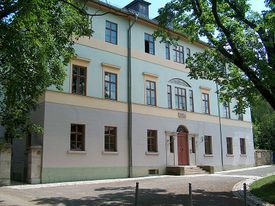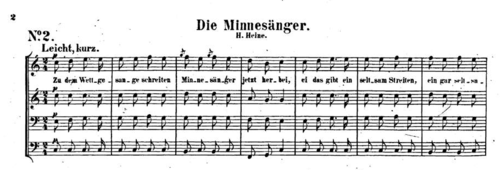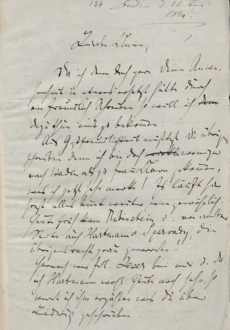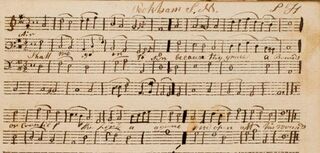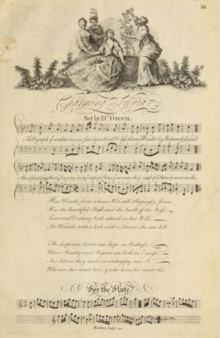Template:DRM reprints
Out-of-copyright editions reproduced in their entirety. Grouped by composer, collection (i.e. within a library or a series), publisher and sheet music (subjects variable, usually from one institution).
Contents
- 1 By Composer
- 2 Ludwig van Beethovens Werke
- 3 Brahms Institute: Digital Archive
- 4 Chopin's First Editions Online (CFEO)
- 5 Jagiellonian Digital Library: Chopin holdings
- 6 University of Chicago: Chopin Early Editions
- 7 Online Chopin Variorum Editions (OCVE)
- 8 Georg Friedrich Händels Werke]
- 9 Franz Liszt Musikalische Werke
- 10 Jean-Baptiste Lully Collection (University of North Texas)
- 11 Felix Mendelssohn Bartoldys Werke
- 12 Neue Mozart Ausgabe Online
- 13 Ignaz Pleyel Early Editions
- 14 Franz Schuberts Werke
- 15 Robert Schumann Werke
- 16 Tomás Luis de Victoria
- 17 By Collection
- 18 Monuments of German Music, Series 1
- 19 Monuments of German Music, Series 2 (Bavaria)
- 20 Duben Collection Database Search
- 21 Eastman School of Music/Sibley Music Library
- 22 Gaspari Online (Bologna Conservatory)
- 23 Printed Music in the Bavarian State Library
- 24 Printed Music in the Prussian State Library
- 25 By Publisher
- 26 Nicolas Du Chemin: Chansons Nouvelles
- 27 Sheet Music Collections and Miscellanies
- 28 University of Michigan list of sheet music collections
- 29 The Sheet Music Cconsortium: A one-stop shop for cross-collection access
- 30 African American Sheet Music
- 31 American Sacred Music
- 32 American Vernacular Music Manuscripts
- 33 Archive of Popular American Music
- 34 The Drs. Whitby Music Collection
- 35 Historic American Sheet Music HASM (Duke University)
- 36 Irish Sheet Music Archives
- 37 Lester Levy Sheet Music Collection
- 38 Lilly Library Sheet Music Collections
- 39 Music for the Nation: American Sheet Music 1870-1885
- 40 Netherlands Radio Music Library
- 41 Nineteenth-Century American Sheet Music (NcASM)
- 42 Nineteenth-Century California Sheet Music
- 43 St. Petersburg Score Collection
- 44 University of North Carolina (UNC)
- 45 University of Toronto Music Faculty Collection
- 46 World War I Sheet Music
- 47 Yiddish Sheet Music
By Composer
Ludwig van Beethovens Werke
The first collected edition of Beethoven's music was published by Breitkopf & Härtel, in Leipzig, between 1862 and 1888. This set contains 269 titles—symphonies, concertos, chamber music, Lieder, folksong arrangements, and much more.
Brahms Institute: Digital Archive
Website: http://www.brahms-institut.de/web/bihl_digital/archiv_index.html
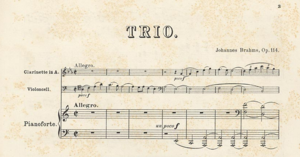
This website of the Brahms Institute in Lübeck (Germany) currently (2016) contains 42,000 images spreading across autograph manuscripts, early prints, photographs, concert programs, and personal documentation.
Chopin's First Editions Online (CFEO)
Website: http://www.cfeo.org.uk/about/description.html
This composite website, based at Royal Holloway College, London, serves more than 5,500 page images of early editions of Chopin's music. The project is headed by John Rink, with the collaboration of numerous holding institutions including the Bibliiothèque Nationale de France (Paris), the Bodleian Library (Oxford), the British Library (London), the University of Chicago, and the Chopin Institute (Warsaw). The separate listings below also function independently. The aim of the umbrella site is to facilitate close examination of sources in diverse collections and to coordinate early prints of Chopin's music with the Annotated Catalogue of Chopin's First Editions.
Jagiellonian Digital Library: Chopin holdings
Website: http://jbc.bj.uj.edu.pl/dlibra/collectiondescription?dirids=186
Featuring 17 volumes of Chopin's piano music at Jagiellonian Library in Kraków. The sites are under development.
University of Chicago: Chopin Early Editions
Website: http://chopin.lib.uchicago.edu
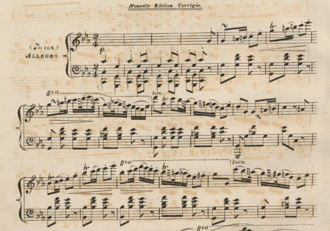
For an easy-to-consult listing of printed music by Chopin in the University of Chicago library, it is hard to surpass the Chopin Online Chopin Online Catalog. Citations are based on the library's shelfmarks, but since the music is digitized, users will have no difficulty in locating what they seek.
Online Chopin Variorum Editions (OCVE)
Website: http://www.ocve.org.uk/index.html
Not so much a single project as a whole constellation of Chopin-related research projects, John Rink's Chopin Variorum investigates such things as the work concept in Chopin's time and provides an annotated catalogue of first editions. Both are coordinated with The Complete Chopin: A New Critical Edition, printed in London (2004).
Georg Friedrich Händels Werke]
The Handel Gesellschaft edition of the composer's works (105 titles) was published by Breitkopf & Härtel between 1885 and 1902. It contains all but a few of the major works known today, sometimes with variants of arias or choruses that were excluded in later editions. [For earlier sources see "Lully" below.]
Franz Liszt Musikalische Werke
Website: http://daten.digitale-sammlungen.de/~db/ausgaben/uni_ausgabe.html?projekt=1193812455
This collected edition of Franz Liszt's works (35 volumes) was published by Breitkopf & Härtel, Leipzig. Although the first volume appeared in 1870, the others appeared between 1900 and 1936. Symphonies, symphonic poems, works for piano and orchestra, Liszt's music criticism, and little-known arrangements are included. The picture at the left shows Liszt's residence from 1848 to 1861, while he was director of court music. Today the Liszt Haus serves as a museum.
Jean-Baptiste Lully Collection (University of North Texas)
Website: http://www.library.unt.edu/collections/music/lully
Twenty-six scores of Lully's best-known dramatic settings are preserved in the music collection of the University of North Texas (Denton TX). Together with arrangements and variants of works by Lully in the 182 holdings of the Virtual Rare Book Room a broad basis for study of Lully's milieu is available here. Dates of works in the broader collection extend to late in the nineteenth century. Among holdings that fall outside this description are a 1743 print of Handel's Alexander's Feast, the first printed edition (1767) of Handel's Messiah, the first version of George Grove's 4-volume Dictionary of Music and Musicians, London, 1879–90, and Girolamo Gigli's original libretto (1689) for an opera called La fede ne' tradimenti, which enjoyed many settings in Italy.
Felix Mendelssohn Bartoldys Werke
This collected edition (162 titles) of Mendelssohn's music was issued by Breitkopf & Härtel. String quartets, quintets, chamber music for clarinet and basset horn, piano trios, works for piano and cello, a fantasy on the Irish song "The last rose of summer" (Op. 15) and many other little-known pieces of chamber music can be found here together with more familiar fare.
Neue Mozart Ausgabe Online
Website: http://dme.mozarteum.at/DME/nma/start.php?l=4
A fully digitized version of the Neue Mozart Ausgabe has been available online since 2006. Series and volumes follow exactly the Bärenreiter print. All elements of the printed exemplars (table of contents, score, critical report) are present. Letters, documents, and libretti will be added by the Digital Mozart Edition at the Mozarteum, Salzburg, in cooperation with the Packard Humanities Institute. This is the only recent collected edition of the works by a major composer currently offered online.
Ignaz Pleyel Early Editions
Website: http://digital.lib.uiowa.edu/pleyel
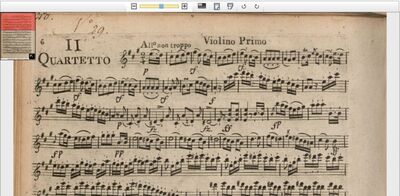
The late musicologist Rita Benton made an exhaustive study of Pleyel's editions (c. 1800) of the early string quartet literature. In the library named after her, more than 200 early editions and manuscripts give some sense of the scope of Pleyel's career as both a composer and a music publisher in the era of Haydn, Boccherini, and other notable composers of chamber music. In editions of chamber music for strings Pleyel also brought out piano pedagogy books and piano trios.
Franz Schuberts Werke
Website: http://daten.digitale-sammlungen.de/~db/ausgaben/uni_ausgabe.html?projekt=1259652551
The collected works of Franz Schubert, as published by Breitkopf & Härtel, Leipzig, 1884-1892. 53 volumes, including symphonic and piano works, choral works, theater pieces, piano four-hands arrangements, and song cycles.
Robert Schumann Werke
The works as edited by Clara Schumann and others. This series was published in Leipzig by Breitkoft & Härtrel between 1881 and 1893. The illustration shows the start of "Die Minnesänger" for four male voices, No. 2 from Schumann's Sechs Lieder.
Tomás Luis de Victoria
Website: http://www.tomasluisvictoria.es/en/content/center
The Centro d' Estusios Tomás Luis de Victoria (CEV) is a comprehensive one aimed at promoting greater familiarity with the music of the noted Spanish composer (1548-1611). To this end it offers a catalog and numerous reprints together with notices of events, podcasts, and a biography of the composer. Its website is optimized for mobile access (via smartphones and tablets).
The bibliographical apparatus is very clearly organized, and the CEV's integration of its diverse resources is a model of sensible organization. Since nearly all of Victoria's music is sacred vocal, the liturgical positioning of individual works is indicated. Links to texts, translations, and sources are fully covered. Some modern editions are credited to CPDL and IMSLP (in most cases relying on Pedrell's edition (Thomae Ludovici Victoria Abulensis Opera omnia), Leipzig 1902–13), while others are newly edited. It has links for discussion forums, facsimiles, monographs, and a discograhy.
Victoria entered musical life as a chorister in Ávila Cathedral, received his formal education and early professional experience in Rome, and upon his return to Spain (1577) entered the service of Dowager Empress Maria of Austria (daughter of Charles V, wife of Maximilian II, and mother of two other emperors) in Madrid. A priest, Victoria preferred convent life and declined several invitations to assume a more conspicuous post. His works consist mainly of masses (including parodies), motets (some sorrowful), Magnificats, Lamentations for Holy Week, and other species of liturgical music. Their performance attracted many listeners to the empress's convent.
By Collection
Monuments of German Music, Series 1
This 53-volume anthology of German music of the seventeenth and eighteenth centuries greatly increased familiarity with the music of Buxtehude, Telemann, J. Ch. F. Bach, Melchior Franck, Hasse, Scheidt, Stoltzer, and many others.
Monuments of German Music, Series 2 (Bavaria)
The second series of this well-known anthology, focused on Bavaria, emphasizes music associated with the Bavarian courts resident in Munich and (through composers such as Dell'Abaco) in exile in Brussels. Also represented are Stamitz, Haßler, Pachelbel, Pez, Steffani, Toeschi, and others. Published in 36 volumes (1901–1926).
Duben Collection Database Search
Website: http://www2.musik.uu.se/duben/Duben.php
The Düben Collection Database Catalogue is a digitised catalogue presenting meta-data and scanned facsimiles of the Düben Collection, a large and important collection of musical manuscripts and prints from the 17th and early 18th centuries. The compilation of the catalogue was initiated in 1987 and is a collaboration between Uppsala University and the University of Rochester.
Eastman School of Music/Sibley Music Library
Website: https://urresearch.rochester.edu/viewInstitutionalCollection.action?collectionId=63
The constantly growing digital collection of the Sibley School of Music is heterogeneous. It includes printed scores, manuscripts, and books—all of them in the public domain under U.S. copyright law. A large percentage of its holdings (currently 22,500 items) come from 19th- and early 20th-century America. Many items are unique.
Gaspari Online (Bologna Conservatory)
Website: http://www.bibliotecamusica.it/cmbm/tools/pro_dig.asp
The Gaspari Catalogue of holdings in the Bologna Conservatory is a resource well known to students of Italian music. It describes the heterogeneous holdings of what is now formally called the Museo Internazionale e Biblioteca della Musica di Bologna (the International Museum and Music Library of Bologna). Composed of multiple underlying libraries and collections, its holdings range from early liturgical sources to music of the twentieth century, from correspondence to musical instruments from earlier centuries to 4,000+ opera libretti (the Corago Project), most searchable from this start site. Under the same umbrella one can also find c. 400 portraits of musicians, mainly from nineteenth-century lithographs (as with Maria Malibran, shown at the right) and the voluminous eighteenth-century correspondence of Giambattista Martini, also edited in book form by Anne Schnoebelen.
Two collections--Corago (see under Libretti) and Ritratti di Musicisti (Musicians' Portraits: see under Image Banks/Iconoteca)--are listed separately.
Printed Music in the Bavarian State Library
This collection of 3,379 titles includes a large number of works from the eighteenth and early nineteenth centuries (Krebs, Türk, Danzi, Mendelssohn, and others). It also holds impressive early printed music, including Pierre Attaignant's seminal collection of Trente e six chansons musicales (1530), use of which is restricted to study. Clemens non Papa, Croce, Lassus, Rore, Vecchi, Wert, and Willaert are much in evidence, as are the publications of Pierre Phalèse the Elder.
Printed Music in the Prussian State Library
Among its treasures, the Prussian State Library in Berlin has recently uploaded (2016) 8,445 digital reprints covering a wide array of musical genres. Some obvious categories are music theory (including obscure tutors on harmony and counterpoint), folk music circulating in earlier centuries, musical dictionaries, comic operas, , hymns, psalm settings, spiritual songs, and a vast number of letters by composers. Our illustration shows one from Brahms, writing in Baden, to Clara Schumann, 15 August 1864. The exchange starts in 1855 and continues into the early 1890s. The date range is from the early sixteenth century to the early twentieth.
By Publisher
Nicolas Du Chemin: Chansons Nouvelles
Website: http://ricercar.cesr.univ-tours.fr/3-programmes/EMN/Duchemin/index.htm
Sixteen sets of books published by Parisian printer Nicolas Du Chemin between 1549 and 1568 are reproduced here in a collection that includes facsimiles, modern transcriptions, scholarly commentaries, and tools for research.
Sheet Music Collections and Miscellanies
University of Michigan list of sheet music collections
Website: http://guides.lib.umich.edu/c.php?g=282790&p=1884296
Sheet music denotes single pieces of music that were published prolifically in the US in parallel with the rise of the recording industry. Most items are for piano and voice, but popular songs were often transposed for several ranges. Many large collections survive in university libraries, and among them several are fully digitized. Redundancies in single-title listings are common, but in general each collection represents nearby publishers disproportionately.
The Sheet Music Cconsortium: A one-stop shop for cross-collection access
Website: http://digital2.library.ucla.edu/sheetmusic
This comprehensive search across many collections is made available by UCLA. The aggregate number of listings is truly staggering. Across 53 linked, indexed collections, we found close to 300,000 listings (April 2023). Most listed collections are in the US, but some inclusions come from the United Kingdom and Australia. This large aggregate corpus produces many redundancies, but sometimes the minute differences (or year, place, or cover art) are very informative. A search for Carrie Jacobs-Bond's "Perfect Day" produced almost 9,500 potential matches, with the earliest examples coming from 1910.
African American Sheet Music
Website: http://library.brown.edu/cds/sheetmusic/afam/index.html
The browsing facility for Brown University's online collection (1454 titles) is very easy to use. Some of the material (e.g. "Music Theater, 1865–1910) is also accessible at the Library of Congress "American Memory" website. Some uses are restricted.
American Sacred Music
This collection of digitized hymnals from the Mills College Music Library recalls the college's origins in 1851, on the heels of the California Gold Rush. The dates of the publications extend from 1833 to 1917.
American Vernacular Music Manuscripts
Website: https://archive.org/details/americanmusicmanuscripts
Murfreesboro, TN, the home of what is now called Middle Tennessee University, was a nexus of popular music-making before jazz established itself in Nashville. This collection of manuscript resources (c. 1730–1910) is full of miscellany but also offers documentation not available anywhere else. For most users the archive.org link given above will be more accessible than the university's Center for Popular Music server. To date 333 shelfmarks (many of them collections) have been uploaded. George Allen's "Reels, Clogs, Hornpipes, Jigs" is representative.
Archive of Popular American Music
Website: http://digital.library.ucla.edu/apam
UCLA's stupendous collection of popular music (450,000 items) is searchable by name, title, date, and cover art subject and several other categories of information. Covers only are scanned.
The Drs. Whitby Music Collection
Website: https://archive.org/details/whitbymusic?&sort=-downloads&page=3
This Canadian collection (1,339 items) at the University of Western Ontario (Waterloo) consists mainly of instrumental music from the nineteenth century. Titles in music theory and pedagogy are abundant. Some unusual anthologies including George Bickham's Musical Entertainer (1740), a collection of arias with obbligato flute parts, are found among its eighteenth-century holdings.
Historic American Sheet Music HASM (Duke University)
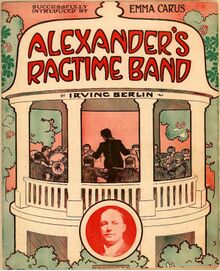
Website: http://library.duke.edu/digitalcollections/hasm
Duke University's Historic American Sheet Music collection (3,000+ titles) spans the time-period 1850–1920. It includes a song-lyrics index, has tabbed browsing, and provides helpful background on the sheet-music printing industry in the US. HASM is also linked to the Library of Congress's American Memory project. It has particular value for matching references in early film music, ragtime, and piano-rolls, that is for repertories that were known principally by ear. Searchable by subject, instrumentation, and illustrator as well as more usual parameters.
Irish Sheet Music Archives
Website: http://irishsheetmusicarchives.com/About-Us.htm
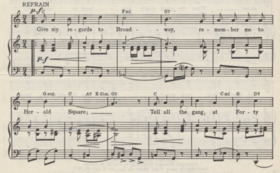
The Irish Sheet Music Archives website is the home of the online sheet music collections found in the Ward Irish Music Archives located in Milwaukee, Wisconsin. It enables searching, viewing, and in the majority of cases downloading its more than 5,000 scores of Irish and Irish-American sheet music. Those wishing to locate scores in the public domain (and therefore downloadable) are best off starting here, where the copyright status, instrumentation, and other details are clearly shown. Specialty subsections contain songs by George M. Cohan (1878-1942) and Harry Lauder (1870-1950), bagpipe pieces arranged for piano, and songs from the first world war.
Lester Levy Sheet Music Collection
Website: http://levysheetmusic.mse.jhu.edu
The Lester S. Levy Sheet Music Collection, based at Johns Hopkins University, contains 29,000 pieces (1780–1980). It is rich in popular music from the nineteenth century, particularly surrounding the years of military conflicts—the war of 1812, the Civil War (1861-65), and the First World War (1914–18). The collector wrote several books on specific subjects within the collection.
Lilly Library Sheet Music Collections
Website: http://www.indiana.edu/~liblilly/collections/sheetmusic.shtml

These collections at Indiana University are very large. Collectively they hold more than 275,000 pieces of American sheet music. Available materials can be searched with the In Harmony search page.
Music for the Nation: American Sheet Music 1870-1885
Website: http://www.loc.gov/collection/american-sheet-music-1870-to-1885/about-this-collection
This Library of Congress collection comes from copyright registrations. It is complemented by sheet-music repertories for the years 1820–1860 and the Civil War years that immediately followed.
Netherlands Radio Music Library
Website: http://www.muziekschatten.nl/action/category?id=1&order=composer&letterPage=v
This treasury of the Netherlands Radio Music Library in Hilversum contains nearly 5000 scores of classical, choral, light, and popular music (including manuscripts). Users can download and print PDF files from the Flash window. They are invited to upload their own sound recordings of the music they downloaded. Most "classical" works are by Dutch composers, and some are arrangements of scores originating elsewhere. Popular sheet music is chiefly from the late nineteenth and earlier twentieth centuries. Since the search pages are only in Dutch, a good starting point is the composer index.
Nineteenth-Century American Sheet Music (NcASM)
Website: http://www2.lib.unc.edu/dc/sheetmusic/index.html
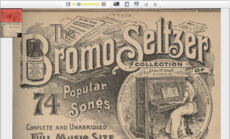
This University of North Carolina website holds almost 7500 digitized pieces from 1815 (music from the opera The Devil's Bridge to 1945 (an edition of Chopin's Polonaise Op. 53) as well as letters pertinent to holdings. The online catalogue search offers many options. Holdings include songs with piano accompaniment to duets, trios, and four-part glees.
Nineteenth-Century California Sheet Music
Website: http://people.ischool.berkeley.edu/~mkduggan/neh.html
The original holdings consisted of 2700 pieces published in California between 1852 and 1900. A further collection of 700 pieces was added in 2007. The project is maintained at the University of California, Berkeley. The pieces represent a wide range of Western US and native American traditions. Some sound, video, and MIDI files are also available.
St. Petersburg Score Collection
Website: http://www.jewishmusic-asjm.org/database-the-st-petersburg-score-collection.html
This collection located in St. Petersburg is maintained by the American Society for Jewish Music. Many published titles are in German and Russian. Publication took place in Kiev, New York, and several places between them.
University of North Carolina (UNC)
Website: https://archive.org/details/uncmus?&sort=-downloads&page=2
The UNC collection (3000+ items) represents categories of popular and religious music in use in the South Central US between 1880 and 1920. In addition, excerpts and short scores for operatic material and pedagogical material make up almost half the holdings. Robert Planquette's three-act comic opera Les Cloches de Corneville is currently the most viewed item. Beyond scans, this recourse offers 10 other download formats including epub, Kindle, Daisy (for print-disabled users), and many more.
University of Toronto Music Faculty Collection
Website: https://archive.org/details/facultyofmusic
The University of Toronto Music Faculty digitization project makes available more than 4,500 items reflecting, overall, the distribution of topical interests relating to music in Canada. The collection is evenly divided between sheet music and now-rare books. The pedagogical emphasis is pronounced. One of the most heavily used items is Theodore F. Freylinghuysen's Tonic Sol-Fa Music Reader (1890), published under his pseudonym Seward.
World War I Sheet Music
Website: http://www.loc.gov/collection/world-war-i-sheet-music/about-this-collection
This collection at the Library of Congress contains almost 14,000 items, all of which are fully digitized. The materials include not only conventional prints but also privately published and unpublished (amateur) material.
Yiddish Sheet Music
Website: http://library.brown.edu/cds/sheetmusic/yiddish/about.html
This special collection at Brown University contains roughly 2,000 items. Much of it represents the Yiddish-language musical stage in Russia around around 1900. Holdings include works by Bores Thomashefsky, the grandfather of Michael Tilson Thomas.
